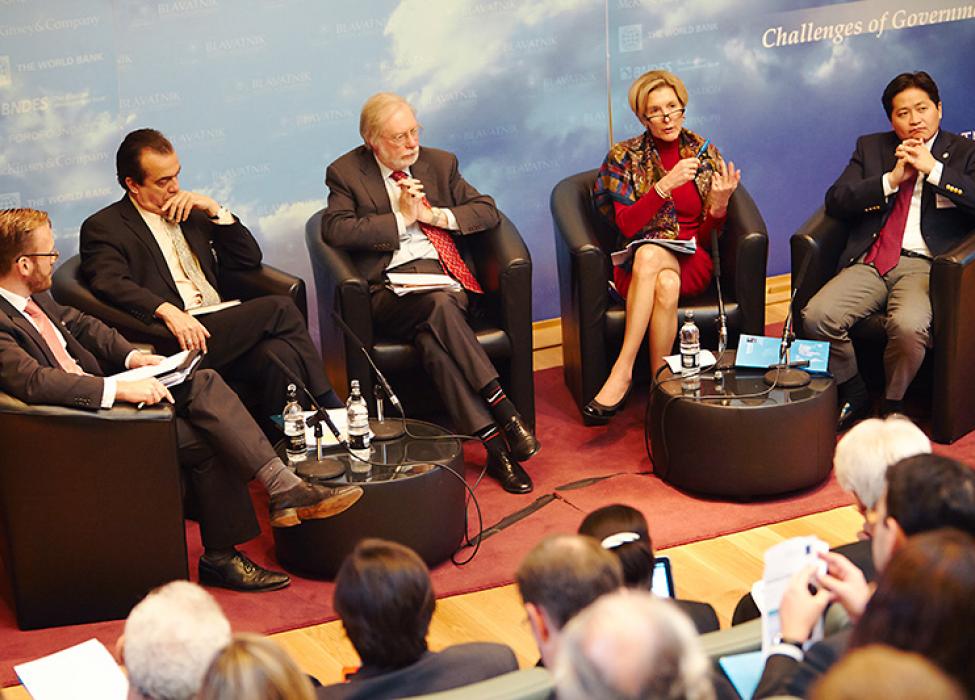Held on 6-7 December 2012
Over the 20th century the world population quadrupled while real GDP increased by a factor of almost 20, making more people better off than ever before. One decade into the 21st century, governments seem hard pressed to maintain this achievement, much less replicate it for the 10 billion people who will inhabit the planet by the century’s end.
Grim news abounds. In June the U.S. Census Bureau reported that American households lost a third of their real wealth between 2005 and 2010, erasing the previous three decades of growth. In some southern European countries nearly half of young people are without work. And China’s three-decade economic boom is finally slowing, threatening to end the commodity surge that has allowed countries ranging from Brazil to Australia to weather the US and European crises. When respected pundits draw analogies to the 1930s, governments must do better. How will we drive the next 100 years of growth and wellbeing?

We focused on three sub-themes that roughly correspond to classic “factors of production”: labour, land, and capital.
- Increasing jobs. The increase of the formal labour force was a crucial driver of 20th century economic growth and, even more importantly, the key mechanism through which large middle classes were created. Today that path to a decent life and a good society looks increasingly narrow, both in the wealthy countries and in industrializing economies like China, where more people still work on farms than in factories. How will we ensure decent work for the labour force of the 21st century? Our discussion will focus on three key topics: skills and training, national labour-market policies, and entrepreneurship.
- Managing Natural Resources for Growth. For a few countries with strong political institutions, natural resources have been a boon. For most, however, they have just as often led to inequality, conflict, and stunted political development. In the last few years, new technologies have radically altered the distribution of resources like natural gas, putting the question of resource management at the top of policymakers’ agenda’s in places as diverse as Tanzania, Brazil, Argentina, and rural pockets of North America. How can we make this potential windfall work to create lasting economic wellbeing?
- Financial regulation, emerging markets and reinventing development banks. Well-operating financial markets should channel investment to the most productive regions and elements of the global economy, but as of late they have failed, and failed catastrophically. How can we regulate financial risk while also ensuring a vibrant flow of capital to those sectors or the economy that need investment for growth.
- Ngozi Okonjo-Iweala, Finance Minister, Nigeria
- Elena Salgado, former Finance Minister and First Vice President, Spain
- Martin Rama, World Bank, lead author of Jobs: World Development Report 2013
- Diana Farrell, Director, McKinsey Center for Government
- Ngaire Woods, Founding Dean, Blavatnik School of Government, Oxford University
- Andrew Whitehouse, Deputy Director of Communications, McKinsey & Co.
- Eric Beinhocker, Executive Director, INET@Oxford
- Martin Rama, World Bank, lead author of Jobs: World Development Report 2013
- Xiaolan Fu, Director, Technology and Management for Development Centre, Oxford Department of International Development
- Eric Braverman, Principal, Public Sector practice, McKinsey & Co.
- João Carlos Ferraz, Vice-President, Brazilian National Development Bank
- Clare Leaver, Lecturer in Economics, Blavatnik School
- Carlos Vargas-Silva, Senior Researcher, Migration Observatory, Oxford
- David Bevan, Emeritus Research Fellow in Economics, Oxford
- Beata Javorcik, Professor of International Economics, Oxford
- Dashdorj Zorigt, former Minister for Mineral Resources and Energy, Mongolia
- Debra Valentine, Group Executive, Legal and Public Affairs, Rio Tinto
- João Carlos Ferraz, Vice-President, Brazilian National Development Bank
- Paul Collier, Professor of Public Policy, Blavatnik School of Government, Oxford
- Monica Toft, Professor of Government and Public Policy, Blavatnik School
- Holly Pattenden, Senior Analyst, Statoil
- Calum Miller, Chief Operating Officer, Blavatnik School
- Christine Cheng, Lecturer in International Relations, King’s College London
- Elodie Grant-Goodey, Head of Societal Issues and Relationships, BP
- Gavin Hayman, Campaigns Director, Global Witness
- Liz David-Barrett, Research Fellow, Saïd Business School, Oxford
- Caroline Kende-Robb, Executive Director, Africa Progress Panel
- Thomas Hale, Postdoctoral Research Fellow, Blavatnik School
- Charles Mason, Professor of Petroleum and Natural Gas Economics, Oxford
- Donald Kaberuka, President, African Development Bank
- João Carlos Ferraz, Vice-President, Brazilian National Development Bank
- Peter Sands, CEO, Standard Chartered
- Nick Lovegrove, Senior Director, Albright Stonebridge Group
- Philipp Hildebrand, Vice-Chairman, Blackrock
- Colin Mayer, Professor and former Dean, Saïd Business School, Oxford
- John Vickers, Warden, All Souls College and Professor of Economics, Oxford
- Adair Turner, Chairman, Financial Services Authority
- John Authers, Senior Investment Columnist, Financial Times
- Jose Antonio Ocampo, Columbia University; former Finance Minister, Colombia
- Martin Cihak, lead author of Global Financial Development Report 2013, World Bank
- Guillermo Larrain Ríos, Chairman, Center for Regulation and Macrofinancial Stability, University of Chile
- Louise Arbour, President, International Crisis Group; former UN High Commissioner for Human Rights
- Haining Liu, MPP candidate, Blavatnik School of Government (China)
- Marian Schreier, MPP candidate, Blavatnik School of Government (Germany)
- Temitope Folaranmi, MPP candidate, Blavatnik School of Government (Nigeria)
- Rafat Al-Akhali, MPP candidate, Blavatnik School of Government (Yemen)
- Aparajita Bharti, MPP candidate, Blavatnik School of Government (India)
- Gideon Rachman, Chief Foreign Affairs columnist, Financial Times
